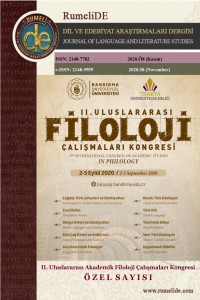Abstract
Sevgi Soysal, çağdaş Türk edebiyatında 1960 sonrası dönemde kadın sorunsalını enine boyuna irdeleyen isimlerden biridir. Ataerkil bir toplumda susturulan ve görmezden gelinen kadın öznenin sesi olmayı edebiyat düzleminde kendisine bir yol olarak seçmiş olan Soysal, çalışmaya konu olan Tante Rosa adlı eserinde geleneğin ve alışkanlıkların biçimlendirdiği bir kasabada yaşayan kapalı bir toplum içinde var olma savaşı veren sıra dışı bir kadının hayatını hikâye eder. Kadınlık içgüdüleriyle toplumun beklentileri arasında gidip gelen ama sonunda iç sesine kulak veren Tante Rosa tek başına, içinde yaşadığı toplumun ve onun kurumlarının, kutsallarının karşısına çıkar. Ataerkil bir anlayışın sürüp gittiği bir ortamda tek başına bir kadın özne olarak Tante Rosa'nın eyleme geçmesi, esasında onun bir kadın birey kimliği kurması manasını içerir. Fakat Tante Rosa'nın kendi bireyliğini kurarken ister istemez toplumla çatışması, onun ağır bir bedel ödemesi gerçeğini de beraberinde getirir. Erkek egemen bir zihniyetin şekillendirdiği toplumla ve bu zihniyetin taşıyıcı araçları olan toplumsal kurumlarla çatışmayı göze alamayan diğer hemcinslerinin tersine bir duruş sergilemesi son tahlilde ona bir şahsiyet kazandırır. Dünya edebiyatında romanın başlangıcından bu yana ortaya konan eserlerde kadının nasıl ele alındığı öteden beri edebiyat çevrelerinde tartışma konusu olmuştur. Bununla birlikte özellikle edebiyata feminist bir perspektiften yaklaşan edebiyatçılar arasında bu konu başat bir tartışma konusu hâlini almıştır. Hem Batılı örneklerde hem Türk edebiyatındaki örneklerde çoğunlukla erkek egemen/ataerkil zihniyetin talep ettiği bir hayat felsefesi doğrultusunda eylemlerini belirleyen kadının makbul/makul kadınlar olduğu, tam tersine bu zihniyetle bir çatışma yürüten kadınların yalnızlaştırıldığı, cezalandırıldığı, dahası şeytanlaştırıldığı görülür. Çalışmaya konu olan romanın başkahramanı Tante Rosa da aynı süreçleri yaşar. Bu çalışmada, Tante Rosa'nın bireysel tercihlerini yaşamak pahasına toplum tarafından nasıl ve niçin hayattan izole edildiği ve bu soyutlamaya karşın Tante Rosa'nın nasıl bir tepki verdiği ve kadın bir birey olarak varoluşunu nasıl tamamladığı feminist eleştiri bağlamında açığa çıkarılmaya çalışılmıştır.
Keywords
References
- Bauman, Z. (2019). Kimlik. Çev.Mesut Hazır, Ankara: Heretik.
- Çevirme, E. A. (2011). Sevgi Soysal'da Sıradışı Bir Kadın Portresi: Tante Rosa. Roman Kahramanları, 6, 47-54.
- Erkman-Akerson, F. (Derleyen). (2013). Edebiyatımızda Bireyselleşme Serüveni. İstanbul: Ayrıntı.
- Gasset, Y. O. (2011). İnsan ve Herkes. Çev.Neyire Gül Işık, İstanbul: Metis.
- Kılıç, H. (2000). Antikçağdan Günümüze Batıda Kadın ve Cinsellik. İstanbul: Otopsi.
- Moran, B. (2012). Edebiyat Kuramları ve Eleştiri. İstanbul: İletişim.
- Sartre, J. P. (2017). Varoluşçuluk. Çev.Asım Bezirci, İstanbul: Say.
- Soysal, S. (2006). Tante Rosa. İstanbul: İletişim...........................
Abstract
Sevgi Soysal is one of the authors in contemporary Turkish literature who thoroughly examines the issue of women in the post-1960 period. Soysal chose to be the voice of female subject that is silenced and ignored in a patriarchal society as a way for herself in the literary plane and she tells the life story of Tanta Rosa, an extraordinary woman struggling to exist in a closed society shaped by tradition and habits, in her work, which is the subject of the study. Tante Rosa, going back and forth between her feminine instincts and the expectations of the society,eventually listens to her inner voice and confronts the society, its institutions and sacred values. In an environment where a patriarchal understanding persists, actions of Tante Rosa by herself as a female subject essentially means establishing anindividual female identity. However, inevitable conflict of Tante Rosa with the society while establishing her own individuality implies that she pays a heavy price in the end. In the final analysis, she gains a new personality in her struggle against the opposite stance of other women, who cannot afford to conflict with the society shaped by a male-dominated mentality, and the social institutions that are the defenders of this mentality. How women are examined in the literature works that have been created since the beginning of the novel genre has been a subject of discussion in literary circles for a long time. Furthermore, this issue has become a dominant topic of discussion, especially among those who approach literature from a feminist perspective. It is observed in both the examples of Western and Turkish literature that women who determine their actions according to a world view demanded by male-dominant/patriarchal mentality are generally considered as reasonable/acceptable women while the women who have a conflict with this mentality are isolated, punished, and moreover demonized. Tante Rosa, the protagonist of the novel that is the subject of the study, experiences the same processes. This study will try to reveal how and why Tante Rosa is isolated from life by the society to live in line with her individual preferences and how she reacts against this isolation and how she completes her existence as an individual woman in the context of feminist criticism.
Keywords
References
- Bauman, Z. (2019). Kimlik. Çev.Mesut Hazır, Ankara: Heretik.
- Çevirme, E. A. (2011). Sevgi Soysal'da Sıradışı Bir Kadın Portresi: Tante Rosa. Roman Kahramanları, 6, 47-54.
- Erkman-Akerson, F. (Derleyen). (2013). Edebiyatımızda Bireyselleşme Serüveni. İstanbul: Ayrıntı.
- Gasset, Y. O. (2011). İnsan ve Herkes. Çev.Neyire Gül Işık, İstanbul: Metis.
- Kılıç, H. (2000). Antikçağdan Günümüze Batıda Kadın ve Cinsellik. İstanbul: Otopsi.
- Moran, B. (2012). Edebiyat Kuramları ve Eleştiri. İstanbul: İletişim.
- Sartre, J. P. (2017). Varoluşçuluk. Çev.Asım Bezirci, İstanbul: Say.
- Soysal, S. (2006). Tante Rosa. İstanbul: İletişim...........................
Details
| Primary Language | Turkish |
|---|---|
| Subjects | Linguistics |
| Journal Section | Turkish language, culture and literature |
| Authors | |
| Publication Date | November 21, 2020 |
| Published in Issue | Year 2020 Issue: Ö8 |

